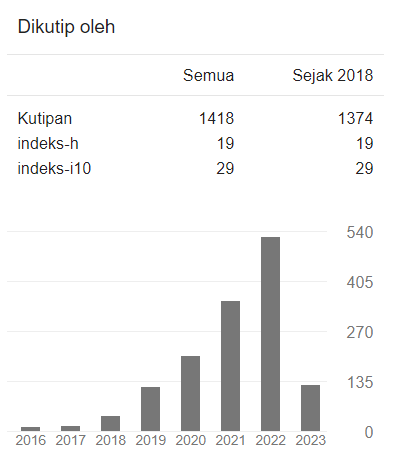Eksplorasi Fenomena Belajar Sistem Kebut Semalam: Kajian Kualitatif Terhadap Kebiasaan Belajar Siswa Kelas VI
DOI:
https://doi.org/10.22219/jp2sd.v11i1.26208Keywords:
Learning Outcomes, Learning Strategy, Overnight Speeding Systems, Learning HabitsAbstract
Learning and preparing for exams is an essential part of academic life. It requires learning skills and effective time management. However, many students are forced or accustomed to studying at the last minute, which can harm student learning and health. This qualitative phenomenological study aims to explore the phenomenon of learning the overnight speeding system by analyzing and describing the overnight speeding system (SKS) learning strategies for 6th graders in SD SD SDN Trobayan and student perceptions of the SKS strategy. This study also seeks to explore the perspectives of teachers and principals on this phenomenon. This study involved four students, one teacher, and the principal as participants. Data was collected through interviews and document analysis and analyzed using a four-step process: data reduction, analysis, presentation, and drawing conclusions. The results showed that the appropriate credit learning strategy was to re-read the material and make a summary. Although not entirely a lousy learning method, it is necessary to pay attention to the habit of studying fast overnight so that it does not affect the health and performance of students. The scores of students who used the overnight speed study system the night before the test showed successful learning, with an average FCJ score of 801 and a QDNA score of 804, which were higher than the class average of 768.12. The findings of this research can provide teachers and students with insight into how to optimize their study strategies and time management skills, as well as avoid the negative consequences of overnight speeding systems.
Downloads
References
Achdiyat, M., & Siti Warhamni, D. (2018). Sikap Cara Belajar Dan Prestasi Belajar. Jurnal Ilmiah Kependidikan, 5(1), 49–58. https://doi.org/http://dx.doi.org/10.30998/fjik.v5i1.2353
Afghani, D. R., Prayitno, H. J., Jayanti, E. D., & Zsa-zsadilla, C. A. (2022). Budaya Literasi Membaca di Perpustakaan untuk Meningkatkan Kompetensi Holistik bagi Siswa Sekolah Dasar. 4(2), 143–152. https://doi.org/10.23917/bkkndik.v4i2.19185
Afriyadi, A. (2021). Peningkatan Aktivitas Belajar Siswa melalui Layanan Informasi Cara Belajar Efektif Increasing Student Learning Activities through Information Services Effective Learning Method dan pihak-pihak lain yang dapat memberikan pengaruh yang besar kepada peserta. 9(1), 96–105. https://doi.org/https://doi.org/10.22487/jko.v9i1.776
Afriyanti, E., Japa, I. G. N., & Renda, N. T. (2021). Hubungan Kebiasaan Belajar dengan Hasil Belajar IPA Siswa. Jurnal Pedagogi Dan Pembelajaran, 4(2), 338. https://doi.org/10.23887/jp2.v4i2.35188
Agustina, M., Azizah, E. N., & Koesmadi, D. P. (2021). Pengaruh Pemberian Reward Animasi terhadap Motivasi Belajar Anak Usia Dini selama Pembelajaran Daring. Jurnal Obsesi : Jurnal Pendidikan Anak Usia Dini, 6(1), 353–361. https://doi.org/10.31004/obsesi.v6i1.1331
Andini, P. A. (2022). Budaya Membaca Di Kalangan Mahasiswa Pgsd (Sebuah Studi Kasus Di Kabupaten Sumedang). Jurnal Cakrawala Pendas, 8(2), 341–351. https://doi.org/10.31949/jcp.v8i2.1976
Andri, A. A. (2022). Metode Menghafal dalam Bimbingan Koseling Belajar Sebuah Tinjauan Teoretis. Al-INSAN Jurnal Bimbingan Konseling Dan Dakwah …, 2(2), 51–67. https://ejournal.iainh.ac.id/index.php/alinsan/article/view/177%0Ahttps://ejournal.iainh.ac.id/index.php/alinsan/article/download/177/108
Andriani, R., & Rasto, R. (2019). Motivasi belajar sebagai determinan hasil belajar siswa. Jurnal Pendidikan Manajemen Perkantoran, 4(1), 80. https://doi.org/10.17509/jpm.v4i1.14958
Annisa, D. S., & Fitria, Y. (2021). Hubungan Kebiasaan Belajar dengan Hasil Belajar IPA Siswa Sekolah Dasar. 4(1), 498–508. https://doi.org/https://doi.org/10.36764/jc.v4i2.384
Berutu, M. H. A., & Tambunan, M. I. H. (2018). Pengaruh Minat Dan Kebiasaan Belajar Terhadap Hasil Belajar Biologi Siswa Sma Se-Kota Stabat. Jurnal Biolokus, 1(2), 109. https://doi.org/10.30821/biolokus.v1i2.351
Caesarridha, D. K. (2021). Hubungan Kualitas Tidur Dengan Konsentrasi Belajar Pada Mahasiswa Fakultas Kedokteran Di Masa Pandemi Covid-19. Jurnal Medika Hutama, 2(4), 1213–1217. http://journal.stainkudus.ac.id/index.php/equilibrium/article/view/1268/1127
Gunarsa, S. D., Wibowo, S., Jasmani, S.-P., & Olahraga, F. I. (2021). Hubungan Kualitas Tidur dengan Kebugaran Jasmani Siswa. Jurnal Pendidikan Olahraga Dan Kesehatan, 09(01). https://ejournal.unesa.ac.id/index.php/jurnal-pendidikan-jasmani/article/view/37777
Harahap, S. R. (2020). Konseling: Kebiasaan Belajar Siswa Dimasa Pandemi Covid-19. Al-Irsyad, 10(1), 30–35. https://doi.org/10.30829/al-irsyad.v10i1.7639
Harandi, S. R. (2015). Effects of e-learning on Students’ Motivation. Procedia - Social and Behavioral Sciences, 181, 423–430. https://doi.org/10.1016/j.sbspro.2015.04.905
Jemudin, F. DE, Makur, A. P., & Ali, F. A. (2019). Hubungan Sikap Belajar Dan Motivasi Belajar Terhadap Prestasi Belajar Matematika Siswa Smpn 6 Langke Rembong. Journal of Honai Math, 2(1), 1–12. https://doi.org/10.30862/jhm.v2i1.53
Kauniyah, H. A. (2016). Hubungan kebiasaan belajar dengan hasil belajar siswa kelas IV SD Se-Gugus II Piyungan. Jurnal Pendidikan Guru Sekolah Dasar. http://journal.student.uny.ac.id/ojs/ojs/index.php/pgsd/article/viewFile/4924/4586
Kuntjoro, M. R. (2020). Analisis Pengaruh Sifat Prokrastinasi pada Siswa SMA hingga Jenjang Universitas di Indonesia. Indonesian Journal of Instructional Media and Model, 2(1), 27. https://doi.org/10.32585/ijimm.v2i1.659
Mawanti, N. D., & Cholily, Y. M. (2021). Peningkatan Minat Belajar Siswa Tunagrahita Menggunakan Model STAD Berbantuan Puzzle di Kelas 1 Sekolah Dasar. Pemikiran Dan Pengembangan Sekolah Dasar, 9(1), 28–39. https://ejournal.umm.ac.id/index.php/jp2sd/article/view/15182%0Ahttps://ejournal.umm.ac.id/index.php/jp2sd/article/download/15182/9573
Nurafni, & Ninawati, M. (2021). Efektivitas Penerapan Aplikasi Linktree dan Wordwall Terhadap Motivasi Intrinsik Siswa Kelas V Sekolah Dasar. Jurnal Pemikiran Dan Pengembangan Sekolah Dasar (JP2SD), 9(2), 217–225. https://ejournal.umm.ac.id/index.php/jp2sd/article/view/17317
Nurfadila, N., Ananda, R., & Aprinawati, I. (2021). Analisis Kebiasaan Belajar Siswa Berprestasi Di Sd Negeri 013 Muara Jalai. Jurnal Review Pendidikan Dasar : Jurnal Kajian Pendidikan Dan Hasil Penelitian, 7(3), 194–197. https://doi.org/10.26740/jrpd.v7n3.p194-197
Prigantini, R. D., & Abdullah, K. (2022). Perubahan Perilaku Belajar Dan Psikologis Siswa Saat Pembelajaran Daring Selama Masa Pandemi Covid-19. Jurnal Cakrawala Pendas, 8(4), 986–1001. http://dx.doi.org/10.31949/jcp.v8i2.2755
Pristiwanti, D., Badariah, B., Hidayat, S., & Dewi, R. S. (2022). Pengertian Pendidikan. Jurnal Pendidikan Dan Konseling (JPDK), 4(6), 1707–1715. https://doi.org/https://doi.org/10.31004/jpdk.v4i6.9498
Putri, R. M., Wanabuliandari, S., Arsyad, M., & Fardani. (2022). Analisis Faktor Yang Mempengaruhi Kurangnya Minat Belajar Matematika Siswa Kelas Iv Mi Tarbiyatul Islamiyah Didesa Winong. Seminar Nasional Pendidikan Matematika (Snapmat) 2022, 2, 29–36. https://conference.umk.ac.id/index.php/snapmat/article/view/177%0Ahttps://conference.umk.ac.id/index.php/snapmat/article/download/177/188
Qodri, A. (2017). Teori Belajar Humanistik Dalam Meningkatkan Prestasi Belajar Siswa. Jurnal Pedagogik, 04(02), 188–202. https://doi.org/https://doi.org/10.33650/pjp.v4i2.17
Rahayu, F. S., Fikriyah, Dianasari, & Nishfa, R. M. (2022). Kejenuhan Belajar Daring Pada Mahasiswa Prodi Pgsd Di Masa Pandemi Covid-19. Jurnal Cakrawala Pendas, 8(1), 326–332. https://doi.org/https://doi.org/10.31949/jcp.v8i1.2007
Rijali, A. (2019). Analisis Data Kualitatif. Alhadharah: Jurnal Ilmu Dakwah, 17(33), 81. https://doi.org/10.18592/alhadharah.v17i33.2374
Rofi’ah, S. (2021). Peneraan Belajar Dengan Pejam Mata Beberapa Detik Untuk Meningkatkan Hafalan Rumus Pada Pelajaran Matematika. 1(2), 101–105. https://doi.org/https://doi.org/10.51878/science.v1i2.409
Sabrina, R., Fauzi, M. Y. (2017). Faktor-Faktor Penyebab Rendahnya Motivasi Belajar Siswa Dalam Proses Pembelajaran Matematika Di Kelas V SD Negeri Garot Geuceu Aceh Besar. 2(July), 1–23. https://jim.usk.ac.id/pgsd/article/view/7736/3350
Simamora, R., & Saragih, E. M. (2021). Pengaruh Kebiasaan Belajar dan Minat Belajar Siswa Teradap Hasil Belajar Siswa. Jurnal Mathematic Paedagogic, 6(1), 45–52. https://doi.org/10.36294/jmp.v6i1.2344
Siyam, H. R., & Siswantari, H. (2021). Strategi Guru Dalam Menghadapi Siswa Pasif Saat Daring di SD Muhammadiyah Gendeng. 908–912. http://seminar.uad.ac.id/index.php/semhasmengajar/article/view/7045/2057
Suardipa, I. P., & Primayana, K. H. (2020). Peran Desain Evaluasi Pembelajaran Untuk Meningkatkan Kualitas Pembelajaran. Widyacarya, 4(2), 88–100. https://doi.org/https://doi.org/10.55115/widyacarya.v4i2.796
Sutama, S., & Anggitasari, B. (2019). Gaya dan Hasil Belajar Matematika pada Siswa SMK. Manajemen Pendidikan, 13(2), 52–61. https://doi.org/10.23917/jmp.v13i2.6396
Tessa, S. M. (2021). Pengaruh Kebiasaan Belajar Tidak Baik Terhadap Hasil Belajar Siswa Kelas VIII Mata Pelajaran IPS Di MTsS Koto Tangah Kecamatan Bukit Barisan Kabupaten Lima Puluh Kota. 6, 703–709. https://www.jptam.org/index.php/jptam/article/view/2970
Utomo, A. C., Abidin, Z., & Rigiyanti, H. A. (2020). Keefektifan Pembelajaran Project Based Learning Terhadap Sikap Ilmiah Pada Mahasiswa PGSD. Educational Journal of Bhayangkara, 1(1), 1–10. https://doi.org/10.31599/edukarya.v1i1.103
Wahyudin, U. R. (2020). Manajemen Pendidikan Teori dan Praktik Dalam Penyelenggaraan Sistem Pendidikan Nasional. CV Budi Utama.
Wijaya, S. A., Novi W, R. A., & Saputri, S. D. (2019). Pengaruh Kebiasaan Belajar Terhadap Prestasi Belajar Siswa. Ekuitas: Jurnal Pendidikan Ekonomi, 7(2), 117–121. https://doi.org/10.23887/ekuitas.v7i2.17917
Downloads
Published
Issue
Section
License
Copyright (c) 2023 Vera Octavia, Nur Amalia

This work is licensed under a Creative Commons Attribution-ShareAlike 4.0 International License.
Authors who publish with Jurnal Pemikiran dan Pengembangan Sekolah Dasar (JP2SD) agree to the following terms:
- For all articles published in Jurnal Pemikiran dan Pengembangan Sekolah Dasar (JP2SD), copyright is retained by the authors. Authors give permission to the publisher to announce the work with conditions. When the manuscript is accepted for publication, the authors agree to automatic transfer of the publishing right to the publisher.
- Authors retain copyright and grant the journal right of first publication with the work simultaneously licensed under a Creative Commons Attribution-ShareAlike 4.0 International License that allows others to share the work with an acknowledgment of the work's authorship and initial publication in this journal.
- Authors are able to enter into separate, additional contractual arrangements for the non-exclusive distribution of the journal's published version of the work (e.g., post it to an institutional repository or publish it in a book), with an acknowledgment of its initial publication in this journal.
- Authors are permitted and encouraged to post their work online (e.g., in institutional repositories or on their website) prior to and during the submission process, as it can lead to productive exchanges, as well as earlier and greater citation of published work (See The Effect of Open Access).

This work is licensed under a Creative Commons Attribution-ShareAlike 4.0 International License.


















